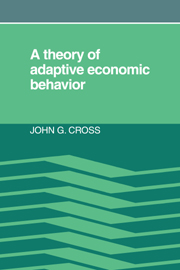Book contents
- Frontmatter
- Contents
- Preface
- 1 Introduction
- 2 Models of convergence
- 3 Behavior in the short run
- 4 Uncertainty
- 5 An application to state lottery games
- 6 An application to the problem of search behavior
- 7 Inflationary disequilibrium
- 8 Advertising and imitation
- 9 An application to migration
- 10 Conclusions
- References
- Index
3 - Behavior in the short run
Published online by Cambridge University Press: 07 October 2011
- Frontmatter
- Contents
- Preface
- 1 Introduction
- 2 Models of convergence
- 3 Behavior in the short run
- 4 Uncertainty
- 5 An application to state lottery games
- 6 An application to the problem of search behavior
- 7 Inflationary disequilibrium
- 8 Advertising and imitation
- 9 An application to migration
- 10 Conclusions
- References
- Index
Summary
We demonstrated in 2 that under relatively weak assumptions, feedback processes will provide convergence to equilibrium states that have the properties of optima. Thus, these feedback models are entirely consistent with the standard comparative-statics equilibrium theories used in economics, and the analysis of long-run responses to changes in exogenous variables can follow the usual comparative-statics pattern. This is the case for both cognitive and behaviorist models; indeed, the purpose of the last was to show that traditional long-run comparative- statics theory is applicable even if individual decision makers eschew cognition entirely and react wholly passively to environmental stimuli.
The congruence between feedback and optimization theories vanishes when we turn to the analysis of short-run or disequilibrium phenomena. By their very nature, optimization models are inapplicable to disequilibrium states, and even the most elementary questions of dynamic adjustment have proved to be resistant to analysis by traditional means. Typical of this problem is the fact that we do not even have a clearly defined theory of short-run price changes in competitive markets. Although we know from comparative statics that equilibrium price in a competitive market rises if the market demand function rises (for a given upward-sloping supply function), according to a literal interpretation of the theory, the first firm to raise its price loses all of its sales as customers seek out its lower-priced competitors.
- Type
- Chapter
- Information
- A Theory of Adaptive Economic Behavior , pp. 41 - 58Publisher: Cambridge University PressPrint publication year: 1983



